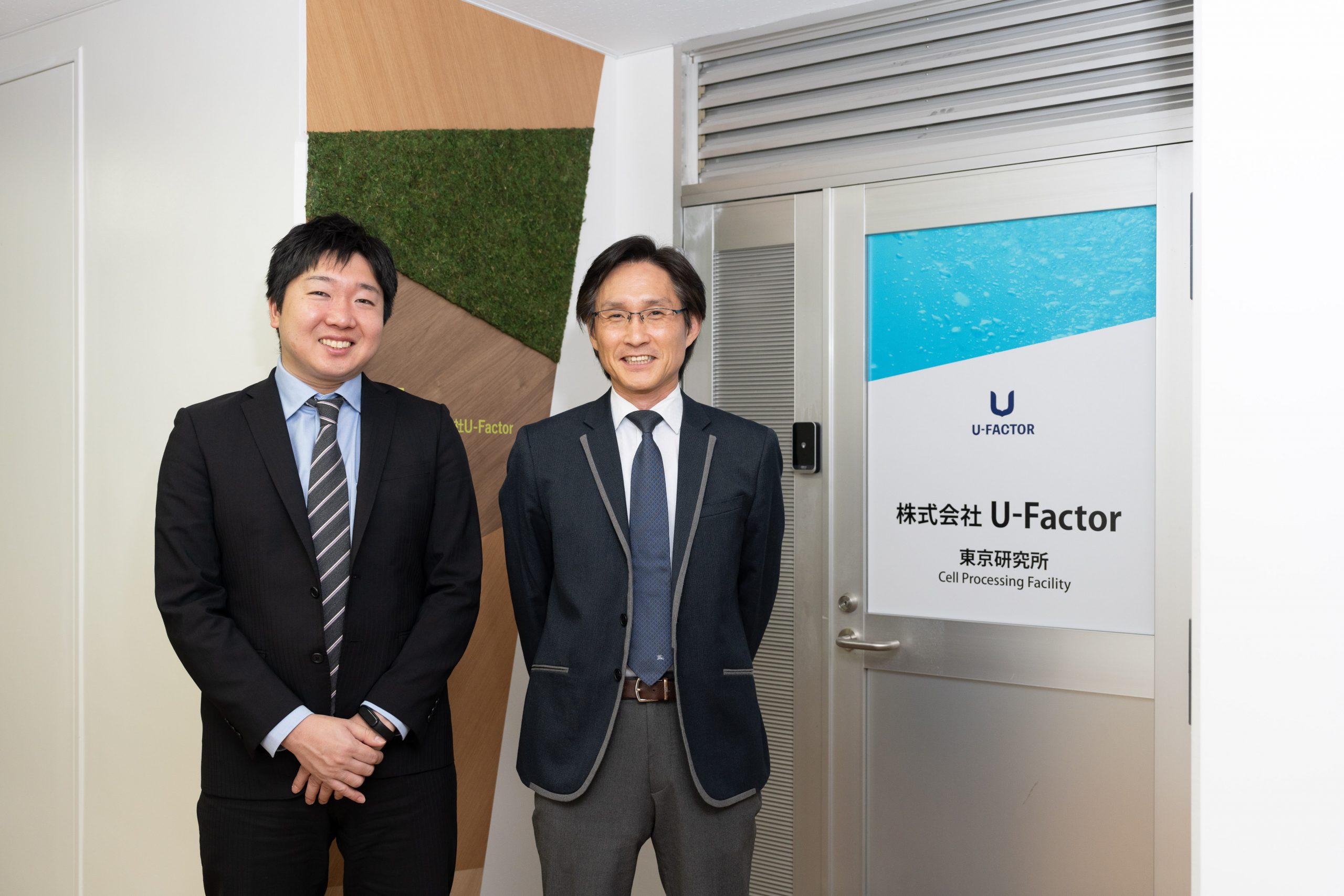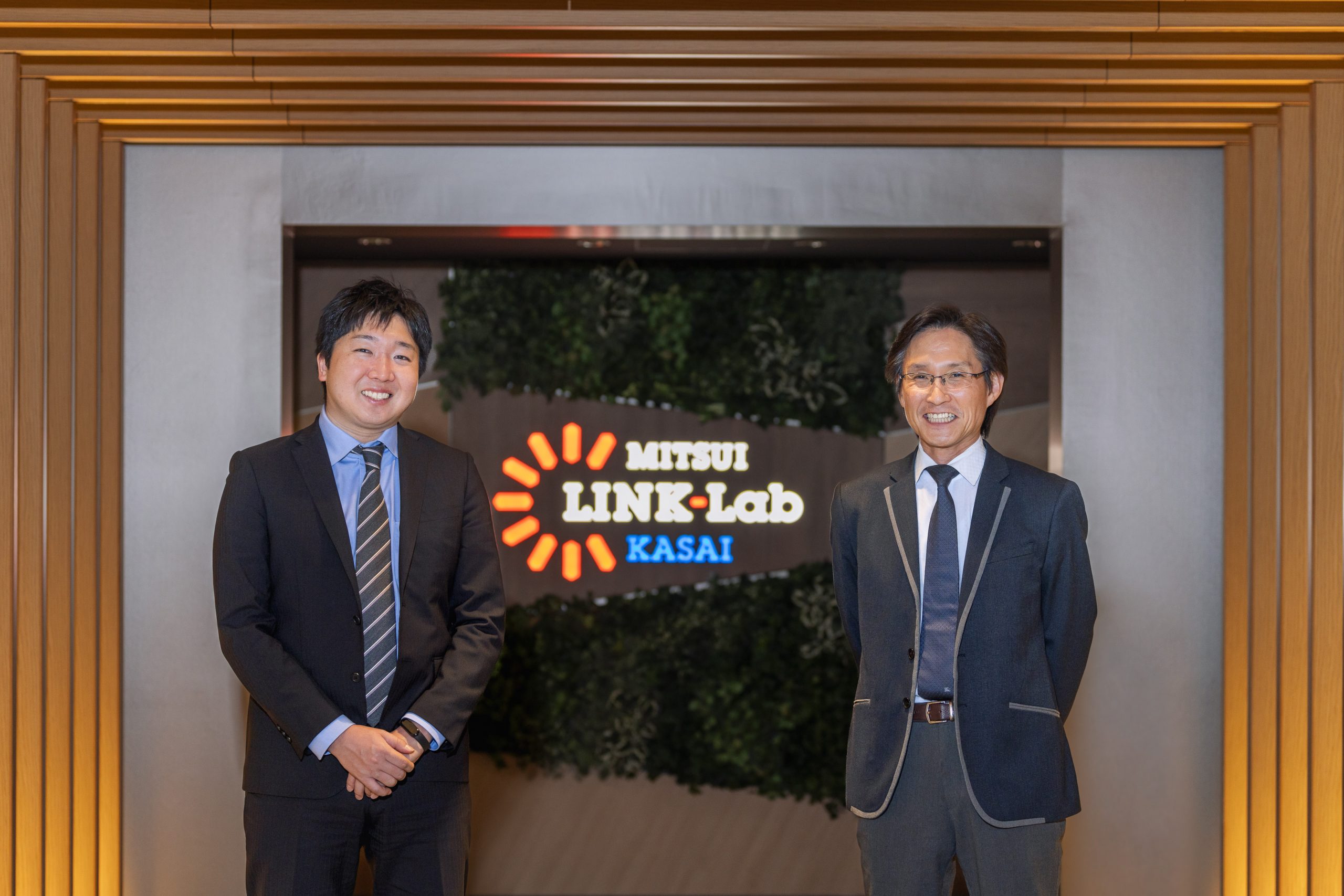We use cultured liquids made by stem cells instead of stem cells themselves for treatment.
First of all, please tell us about your business.
Mr. U-Factor Hori: We are a company that takes on the challenge of new regenerative medicine using a cultured serum solution created by stem cells (named U-Factor solution). There are many companies in Japan that are working on the development of regenerative medicine using stem cells themselves, but it seems that we are the only company in Japan that develops pharmaceuticals using stem cell-derived cultured serum. Our company was established by Mr. Hidehiro Ijima (President and CEO) and Mr. Minoru Ueda (Director, Professor Emeritus of Nagoya University) and myself.
Mr. Otake U-Factor: Our technology is based on the research content of Dr. Minoru Ueda. Dr. Ueda discovered through non-clinical studies that the cultured serum solution derived from stem cells contains various bioactive substances, especially the cultured serum made from the dental stem cells of milk teeth has the potential to exert a high therapeutic effect on neurodegenerative diseases such as amyotrophic lateral sclerosis. Therefore, we are further advancing the research results of Dr. Ueda and working on the formulation of a cultured serum using dental stem cells in milk teeth.
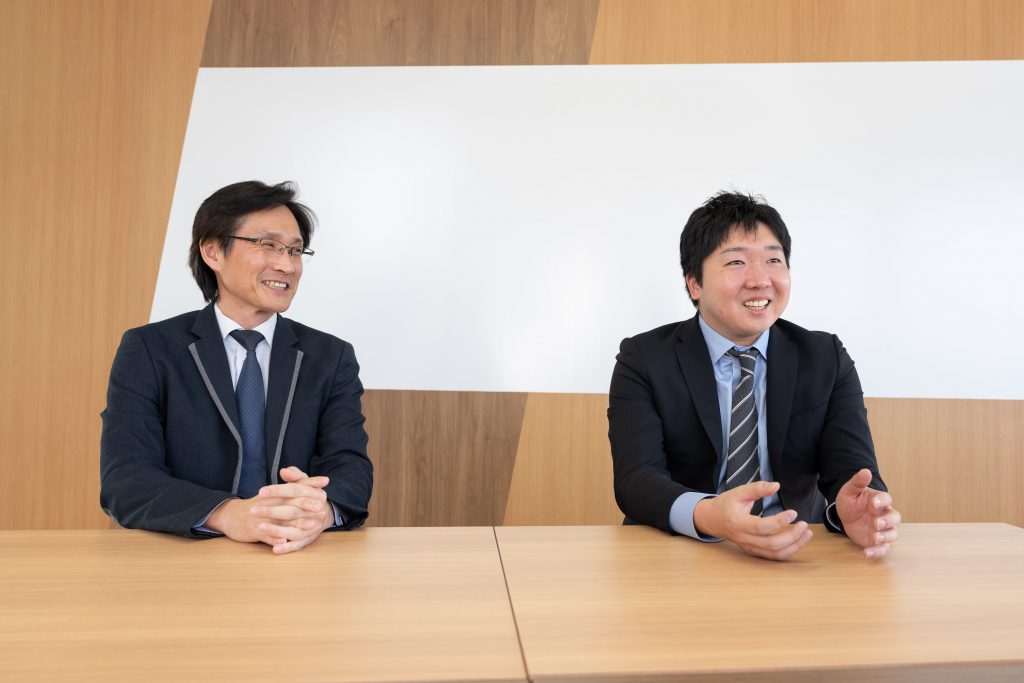
Please tell us about the uniqueness of your business.
Mr. Otake U-Factor: Our technology purifies the ingredients of the cultured serum and uses them for treatment, so we do not administer the cells themselves. In fact, the mechanism of action of stem cell regenerative medicine is thought to be "promoting tissue regeneration by stem cells adhering to organs and tissues and secreting liquid factors." Therefore, we thought that "it is good to purify the upper liquid that contains a large amount of liquid factors and make it a medicine." Since the cells are not administered, the risk of injected cells embolize blood vessels, rejection and infection can be avoided.
Mr. U-Factor Hori: Currently, we are conducting daily research at Mitsui Link Lab Kasai in order to produce higher quality culture liquids. We are conducting joint research with external research institutes such as the National Institute of Advanced Industrial Science and Technology and Keio University to determine what kind of diseases can be used for the treatment of cultured fluids. Once we have established mass production technology, we plan to introduce it to pharmaceutical companies and others in the future.
What are the challenges in your current business development?
Mr. U-Factor Hori: The current situation is full of challenges. It is difficult to define as a modality only in the area where no one has yet begun, such as culture-based serum solution. We are working on development in consultation with the Pharmaceuticals and Medical Devices Agency (PMDA). By the end of next year, we will start non-clinical trials for technology transfer, and in the next few years we will start the world’s first clinical trial, the Phase I trial.
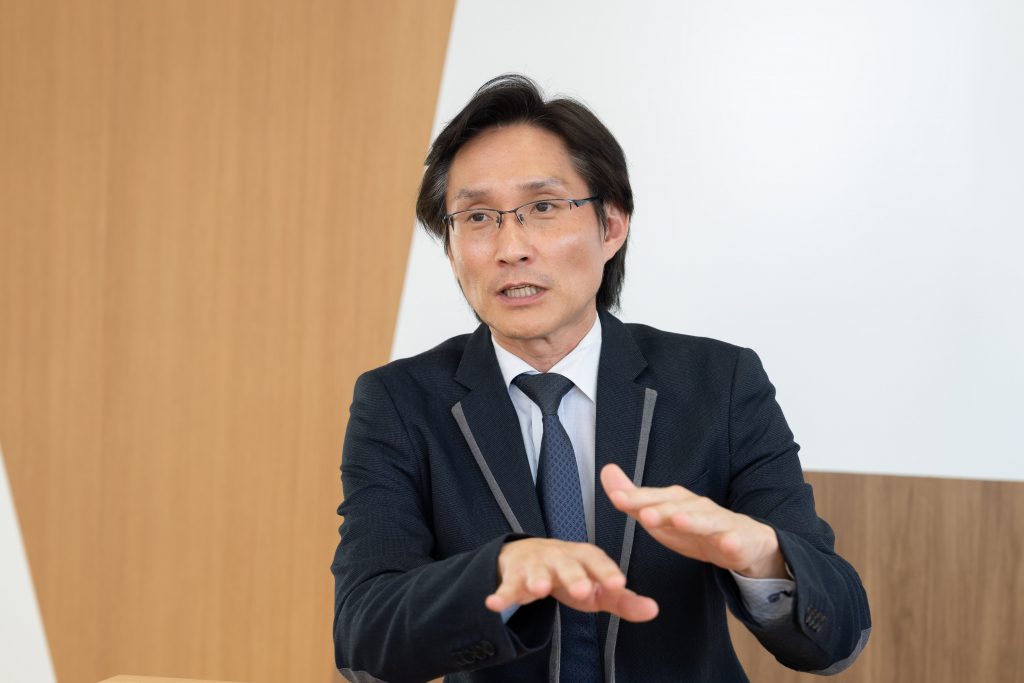
"A sense of security" that can be studied at Mitsui Link Lab Kasai
Please tell us how you moved into Mitsui Link Lab Kasai.
Mr. U-Factor Hori: In March 2020, shortly after the establishment of the company, I had the opportunity to consult with the person in charge of Mitsui Link Lab. At that time, the first declaration of a state of emergency was just issued due to the nationwide outbreak of COVID-19, but I remember that the person in charge responded very carefully, "Would you like to see the lab when declaration of a state of emergency is dawn?" After that, I also took various consultations, and in June of that year I decided to move into Mitsui Link Lab Kasai.
Please tell us if there is any "benefit of the lab" that you felt when you actually moved in.
Mr. U-Factor Hori: I don't know much about the situation of other labs, but there is a sense of security that Kasai Labs is located within the Kasai Research and Development Center of Daiichi Sankyo Co., Ltd. In particular, in the case of our company, we prepare a clean room with cleanliness comparable to cell culture facilities for products such as regenerative medicine, and challenge the culture and product development of a cultured fluid, so the existence of a laboratory that can be used with peace of mind is very important.
Mr. Otake U-Factor: In Kanto, there are several other rental office labs, but each has different characteristics. For example, if it is a university-related facility, the period of occupancy may be limited from the beginning. In the case of our company, setting up a clean room in-house was a decision from the beginning, so it is difficult if there is a deadline. In that regard, Mitsui Link Lab Kasai was attractive.
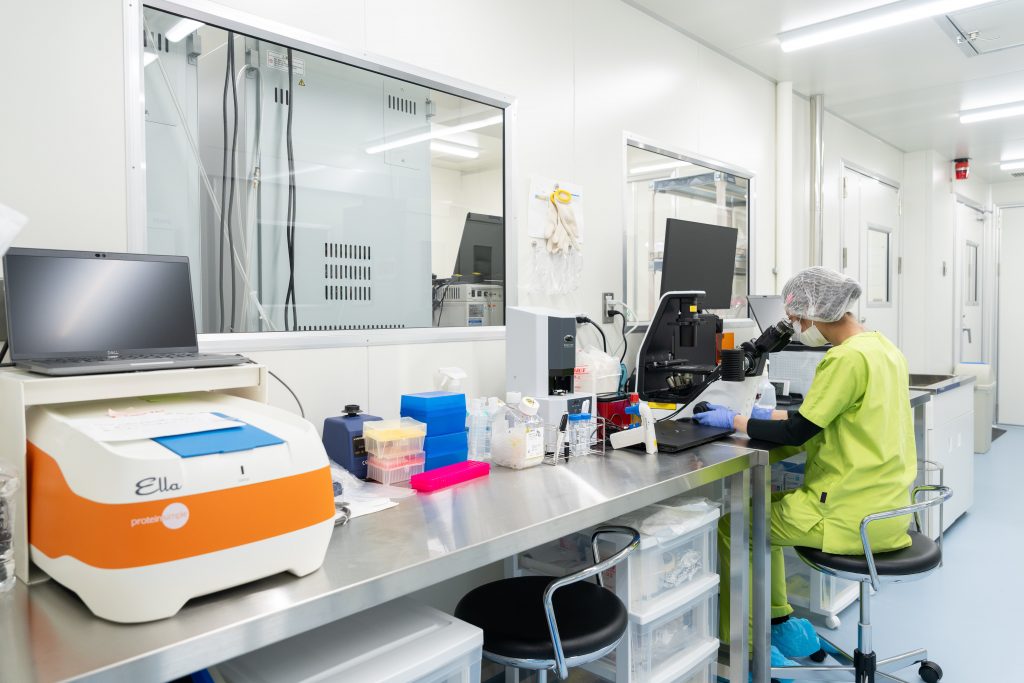
Why do you need a clean room instead of a regular lab?
Mr. Otake U-Factor: This is because lab-scale research results alone cannot shift to production. Between research and development in the laboratory and verification in the manufacturing process, an intermediate process called "consideration in a clean room environment" is essential. Therefore, by conducting the first lab-scale research itself in a clean room environment, we are increasing the likelihood of success in future product development. In fact, there are many cases where research at this intermediate point (bridge research) is not successful, and development is stalled.
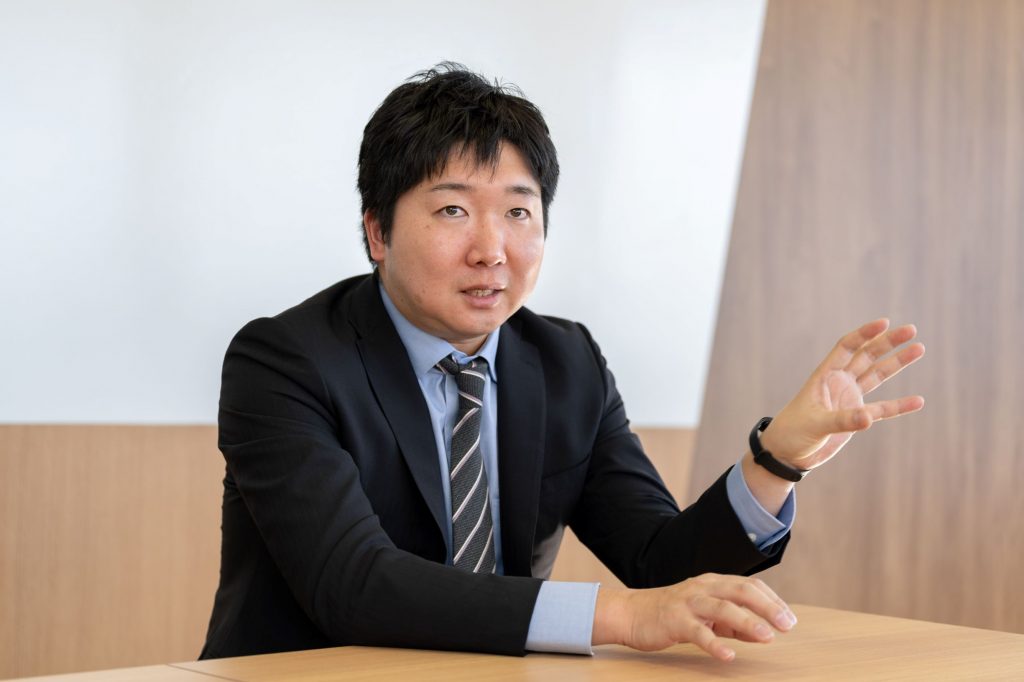
Kasai Lab will continue to be the most upstream of our research and development
Are you participating in the LINK-J event?
Mr. U-Factor Hori: Since the spring and summer of last year, we have been actively participating in symposiums and study sessions organized by LINK-J, and we encourage our staff to participate. For R&D companies like our company, acquiring new knowledge and information is important, and we use it as much as possible. In addition, since the work of a culture teacher tends to be locked up in the lab, the opportunity to look at external trends and listen to the stories of various people is a valuable opportunity in terms of improving their careers.
Finally, please tell us about your future goals and prospects.
Mr. U-Factor Hori: In the future, we would like to achieve mass production by outsourcing pharmaceutical products refined from cultured serum to contract pharmaceutical manufacturing agencies. In addition, our lab at Mitsui Link Lab Kasai will continue to be the root of our R&D activities and the most upstream of our development process. In the end, we are thinking about expanding not only in Japan but also overseas, and we have already made a blueprint for that. I often talk with research staff, "The daily work itself is very sober, but let's do our best with the consciousness that we are actually trying to develop amazing things!"
In today's regenerative medicine, there was a problem that artisanal technology to increase the number of cells by hand was required, so it was inevitably expensive medical care. On the other hand, we were born with the goal of "delivering regenerative medicine available for $1 to patients suffering from intractable neurological diseases through mass production of cultured purifiers." We are still challenging development with the enthusiasm that "If we can't do medicine, the company will dissolve!", And we will continue to do our best to achieve that goal.
